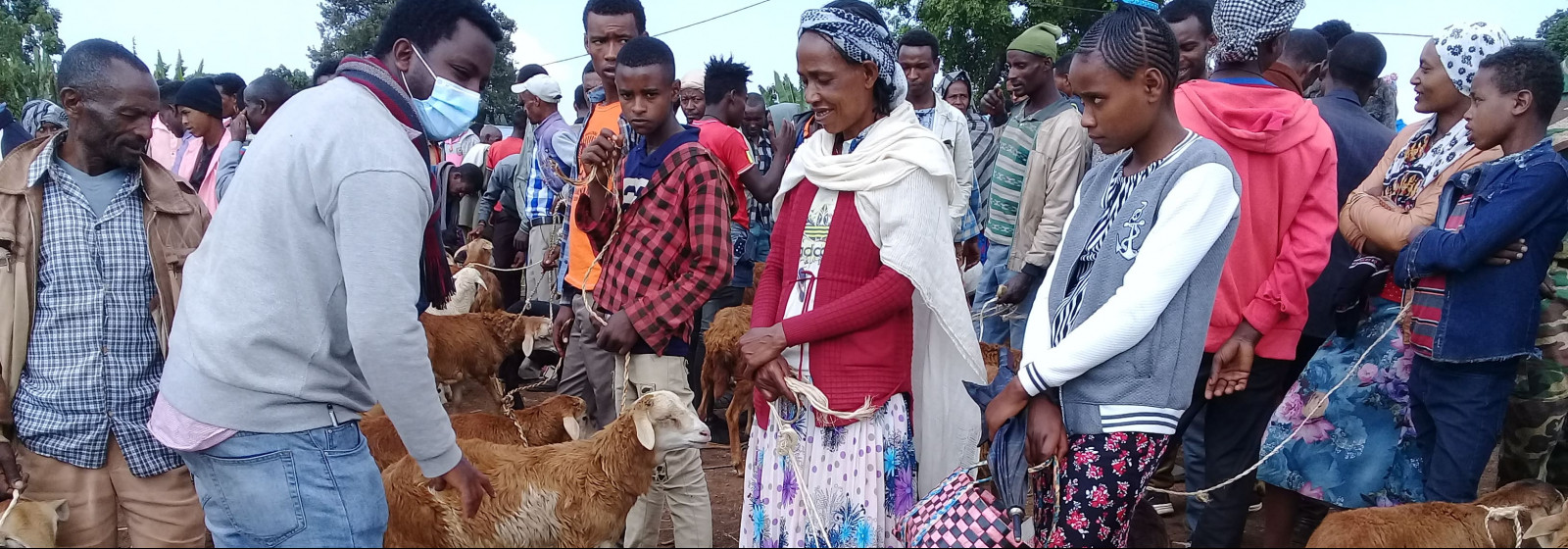Smallholder livestock keepers face many market challenges such as low prices, weak bargaining power, lack of market information, high transaction costs, lack of group actions, distance to markets, lack of marketing infrastructure, erratic and unorganized markets, and lack of market linkage facilitation support.
To explore the marketing needs and challenges of community members and their perceptions towards collective marketing actions, the CGIAR Research Program on Livestock team from the International Center for Agricultural Research in the Dry Areas (ICARDA) and the International Livestock Research Institute (ILRI) facilitated community conversations in Zeram community of Menz Mama District in Ethiopia’s Amhara region. The event was organized in collaboration with Debre Berhan Agricultural Research Center and development partners in the district.
While there is no cultural constraint keeping women from livestock market participation, women discussion group members identified challenges to their market participation related to self-confidence, empowerment, access to market information and financial literacy. A woman participant in Zeram community said she often sought the advice of men in the market to make a price decision. Regarding their ability to negotiate prices, women group members said that they felt unconfident when buying compared to selling animals. A woman participant said, ‘If I like an animal, I will ask a man to negotiate and buy the animal for me, and I keep away from the discussion’.
In Zeram, both male and female discussion groups identified only a few markets, such as farm gate to other farmers, traders or consumers and nearby town markets, indicating that the livestock market is underdeveloped, and farmers have limited livestock marketing opportunities.
Both couples in male-headed households participate in livestock marketing. However, their purpose of selling animals reflects their traditional gender roles, as women reported selling animals to cover household needs and men to buy animal feeds, improved seeds or fertilizers and pay for tax. The community conversations suggested that men and women’s market participation depends on the types of markets they access. Women often sell animal species and products at the farm gate to other farmers and traders or walkable town markets. Time and mobility constraints and transaction costs involved in selling to distant or outside markets are critical challenges to women’s market participation.
Distance to markets influences women’s ability to control income from livestock sales. While women group members reported making joint decisions and have joint income management roles in their households, some noted that their ability to control income declines when livestock is sold in outside markets, because they do not have information on prices there unless their spouses are transparent or just trust them with that information. Women members reported that nearby or village markets give them more control over income because they can readily access market information and directly participate in the markets.
While community members have longstanding experience in group actions such as savings groups (‘equib’), labour-sharing groups (‘debo’, ‘wenfel’), and mutual assistance groups (‘edir’), which can be extended to form marketing groups; they lack skills and practice in marketing their animals in groups.
Community members in Zeram have recently established sheep production and marketing cooperative whose members include both men and women. A woman participant in the community conversation said such mixed-group cooperatives can address many of the problems women face in marketing livestock, such as limited access to market information, labour requirement to drive animals to markets and negotiating for better prices. During the conversations, women group members reported that, women-only edirs (burial groups) are managed by men reflecting what may be a lack leadership and management skills and confidence among women and highlighting the need for training and mentorship support in organizational and representation skills to help women benefit from their memberships in cooperatives and mixed gender community groups.
Information and knowledge are an important determinant of economic performance. Increasing women’s access to livestock production and marketing information, for example, and developing their engagement capacities, bargaining power, and organizational and leadership skills can increase their participation and benefits from livestock production and marketing. As a gender transformative community engagement approach, community conversations can help community members and partners achieve both gender equality and sectoral development outcomes.
The gender dynamics of the newly established sheep production and marketing cooperative will need to be carefully assessed and strengthened to determine the patterns of, and encourage, women’s participation in markets, decision-making and their benefits from livestock sales. While collective action can benefit women, unless specifically addressed, women’s limited confidence, financial illiteracy, and low market participation may not improve as livestock markets get organized and vertically integrated, since men often dominate the leadership and decision-making processes in marketing cooperatives.
Self-help groups such as village savings groups are one method of organizing women and developing their leadership skills, empowering them and giving them the confidence to participate actively in marketing cooperatives.
